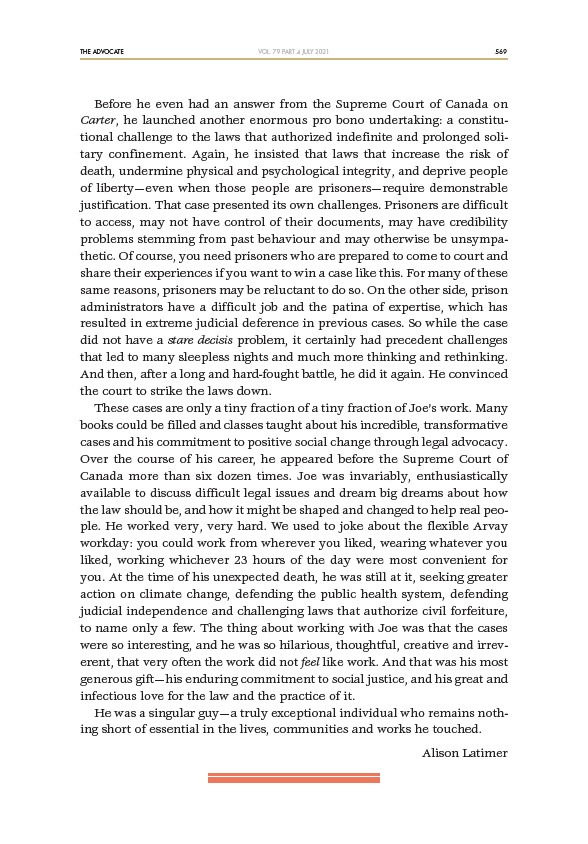
THE ADVOCATE 569
VOL. 79 PART 4 JULY 2021
Before he even had an answer from the Supreme Court of Canada on
Carter, he launched another enormous pro bono undertaking: a constitutional
challenge to the laws that authorized indefinite and prolonged solitary
confinement. Again, he insisted that laws that increase the risk of
death, undermine physical and psychological integrity, and deprive people
of liberty—even when those people are prisoners—require demonstrable
justification. That case presented its own challenges. Prisoners are difficult
to access, may not have control of their documents, may have credibility
problems stemming from past behaviour and may otherwise be unsympathetic.
Of course, you need prisoners who are prepared to come to court and
share their experiences if you want to win a case like this. For many of these
same reasons, prisoners may be reluctant to do so. On the other side, prison
administrators have a difficult job and the patina of expertise, which has
resulted in extreme judicial deference in previous cases. So while the case
did not have a stare decisis problem, it certainly had precedent challenges
that led to many sleepless nights and much more thinking and rethinking.
And then, after a long and hard-fought battle, he did it again. He convinced
the court to strike the laws down.
These cases are only a tiny fraction of a tiny fraction of Joe’s work. Many
books could be filled and classes taught about his incredible, transformative
cases and his commitment to positive social change through legal advocacy.
Over the course of his career, he appeared before the Supreme Court of
Canada more than six dozen times. Joe was invariably, enthusiastically
available to discuss difficult legal issues and dream big dreams about how
the law should be, and how it might be shaped and changed to help real people.
He worked very, very hard. We used to joke about the flexible Arvay
workday: you could work from wherever you liked, wearing whatever you
liked, working whichever 23 hours of the day were most convenient for
you. At the time of his unexpected death, he was still at it, seeking greater
action on climate change, defending the public health system, defending
judicial independence and challenging laws that authorize civil forfeiture,
to name only a few. The thing about working with Joe was that the cases
were so interesting, and he was so hilarious, thoughtful, creative and irreverent,
that very often the work did not feel like work. And that was his most
generous gift—his enduring commitment to social justice, and his great and
infectious love for the law and the practice of it.
He was a singular guy—a truly exceptional individual who remains nothing
short of essential in the lives, communities and works he touched.
Alison Latimer